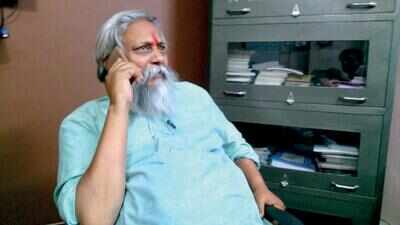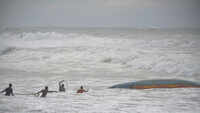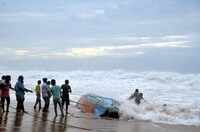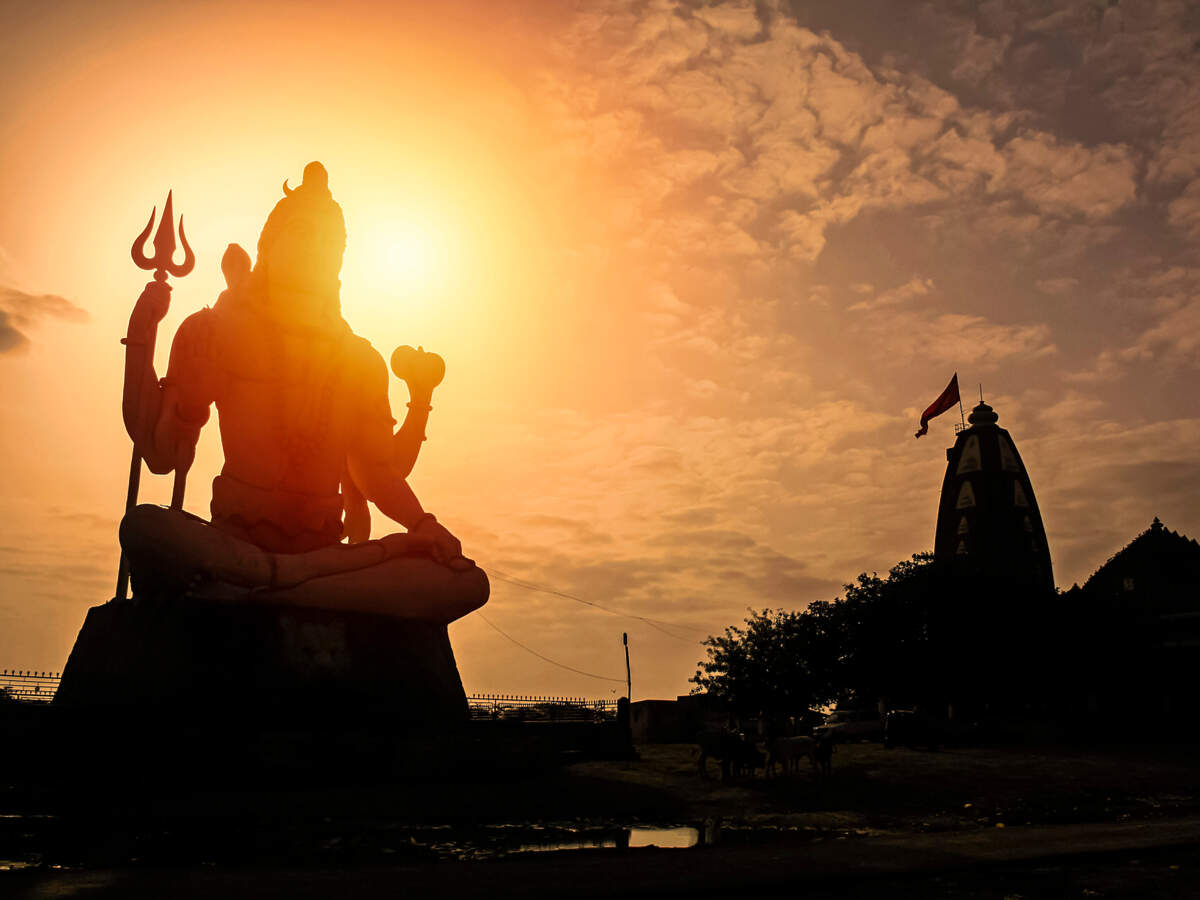
Jhansi: Water conservationist Rajendra Singh firmly believes that the much-touted Ken-Betwa river interlinking project will not solve the crisis in the state’s parched Bundelkhand region in even half a century.
The Magsaysay Award winner, popularly known as Jal Purush or Waterman of India, said the project would instead benefit corporate houses who would vie for control of the river system and leave villagers feeling short-changed.
According to the conservationist, no villager wants the project to see the light of day. “It is only a few global companies, from France and Germany, that want the project to happen so that they can market their machines and further privatise water, which they will then sell to people.”
Singh stressed that the project involved “78% corruption”. The Bundelkhand Package, floated by the erstwhile UPA government too didn’t bear results because a sizeable chunk of money was being paid to the middlemen, he said.
The river crusader nonetheless hailed the tank digging project, initiated by the erstwhile Akhilesh Yadav-led SP government in the state. He called it “more sustainable and practical” since the project had taken villagers into confidence and financial bungling was not easy.
Singh was here on a daylong trip to review the work of jal sahelis, a group of village women aided by NGO Parmarth who have made water conservation their priority.
The conservationist said jal saheli was a community-driven decentralised experiment that was both ideal and practical in terms of water conservation. “It is a correlation of three Ns — neer (water), nadi (river) and nari (woman). If water is life, river is the flow of life and woman, the creator of life. Till the time we respected these three, we had no issues. Once we stopped, we became parched,” he said.
According to Singh, drought and floods are two sides of the same coin. “If we take care of one, we solve the other problem by default,” he said, pitching for more volunteers like the jal sahelis and for government incentives to keep such groups motivated.
Speaking on the recurring spells of drought in Bundelkhand, he said no political party had the issue on their agenda or election manifesto not just in the state but in the entire country. Budget allocated to stem water crisis is either pocketed by political parties or middlemen, he argued.
So, is there a solution at all? “If we are able to rejuvenate the old water bodies built during the Chandela and Bundela rule, we may be able to end the drought curse on Bundelkhand,” Singh summed it up.
The Magsaysay Award winner, popularly known as Jal Purush or Waterman of India, said the project would instead benefit corporate houses who would vie for control of the river system and leave villagers feeling short-changed.
“I can give you in writing that this river linking project will not solve the problem of water scarcity in the region in the coming 50 years; it won’t stem water crisis even if they spend Rs 20,000 crore. I was a member of the reviewing committee under the Manmohan Singh government and had shelved the project,” Singh said during his recent visit to Bundelkhand.
According to the conservationist, no villager wants the project to see the light of day. “It is only a few global companies, from France and Germany, that want the project to happen so that they can market their machines and further privatise water, which they will then sell to people.”
Singh stressed that the project involved “78% corruption”. The Bundelkhand Package, floated by the erstwhile UPA government too didn’t bear results because a sizeable chunk of money was being paid to the middlemen, he said.
The river crusader nonetheless hailed the tank digging project, initiated by the erstwhile Akhilesh Yadav-led SP government in the state. He called it “more sustainable and practical” since the project had taken villagers into confidence and financial bungling was not easy.
Singh was here on a daylong trip to review the work of jal sahelis, a group of village women aided by NGO Parmarth who have made water conservation their priority.
The conservationist said jal saheli was a community-driven decentralised experiment that was both ideal and practical in terms of water conservation. “It is a correlation of three Ns — neer (water), nadi (river) and nari (woman). If water is life, river is the flow of life and woman, the creator of life. Till the time we respected these three, we had no issues. Once we stopped, we became parched,” he said.
According to Singh, drought and floods are two sides of the same coin. “If we take care of one, we solve the other problem by default,” he said, pitching for more volunteers like the jal sahelis and for government incentives to keep such groups motivated.
Speaking on the recurring spells of drought in Bundelkhand, he said no political party had the issue on their agenda or election manifesto not just in the state but in the entire country. Budget allocated to stem water crisis is either pocketed by political parties or middlemen, he argued.
So, is there a solution at all? “If we are able to rejuvenate the old water bodies built during the Chandela and Bundela rule, we may be able to end the drought curse on Bundelkhand,” Singh summed it up.
#ElectionsWithTimes
more from times of india cities
Elections 2019

Trending Topics
LATEST VIDEOS
City
 Watch: Cloud covered sky, rough sea weather conditions in Visakhapatnam under the influence of cyclone Fani
Watch: Cloud covered sky, rough sea weather conditions in Visakhapatnam under the influence of cyclone Fani  Gurugram: Shocking case of moral policing, woman attacks youngsters over short dresses
Gurugram: Shocking case of moral policing, woman attacks youngsters over short dresses  Watch: Fishermen brave rough sea condition to bring back boat
Watch: Fishermen brave rough sea condition to bring back boat  Mumbai: Hotelier assaulted by unidentified man at Vasai railway bridge
Mumbai: Hotelier assaulted by unidentified man at Vasai railway bridge
More from TOI
Navbharat Times
Featured Today in Travel
Quick Links
Lok Sabha Election Schedule 2019Lok Sabha Election NewsDelhi Capitals teamMI team 2019Rajasthan Royals 2019RCB team 2019Maharashtra Lok Sabha ConstituenciesBJP Candidate ListBJP List 2019 TamilnaduShiv Sena List 2019AP BJP List 2019Mamata BanerjeeBJP List 2019 MaharashtraPriyanka GandhiBJP List 2019 KarnatakaAMMK Candidate List 2019BJP List 2019 WBLok Sabha Elections in Tamil NaduBSP List 2019 UPNews in TamilLok Sabha Poll 2019Satta Matka 2018PM ModiMahagathbandhanNagpur BJP Candidate ListChandrababu NaiduTamil Nadu ElectionsUrmila MatondkarNews in TeluguMadras High CourtTejashwi YadavArvind KejriwalTejasvi SuryaPawan KalyanArvind KejriwalYogi AdityanathJaya PradaSatta King 2019Srinagar encounter
Get the app




